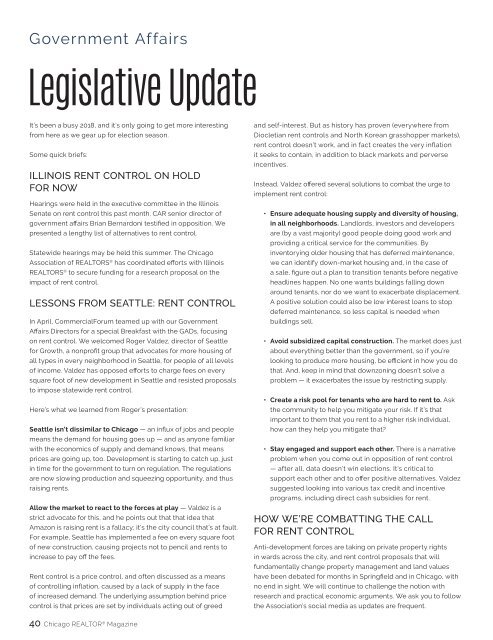CR Magazine - Summer 2018
The official publication of the Chicago Association of REALTORS®.
The official publication of the Chicago Association of REALTORS®.
Create successful ePaper yourself
Turn your PDF publications into a flip-book with our unique Google optimized e-Paper software.
Government Affairs<br />
Legislative Update<br />
It’s been a busy <strong>2018</strong>, and it’s only going to get more interesting<br />
from here as we gear up for election season.<br />
Some quick briefs:<br />
ILLINOIS RENT CONTROL ON HOLD<br />
FOR NOW<br />
Hearings were held in the executive committee in the Illinois<br />
Senate on rent control this past month. CAR senior director of<br />
government affairs Brian Bernardoni testified in opposition. We<br />
presented a lengthy list of alternatives to rent control.<br />
Statewide hearings may be held this summer. The Chicago<br />
Association of REALTORS ® has coordinated efforts with Illinois<br />
REALTORS ® to secure funding for a research proposal on the<br />
impact of rent control.<br />
LESSONS FROM SEATTLE: RENT CONTROL<br />
In April, CommercialForum teamed up with our Government<br />
Affairs Directors for a special Breakfast with the GADs, focusing<br />
on rent control. We welcomed Roger Valdez, director of Seattle<br />
for Growth, a nonprofit group that advocates for more housing of<br />
all types in every neighborhood in Seattle, for people of all levels<br />
of income. Valdez has opposed efforts to charge fees on every<br />
square foot of new development in Seattle and resisted proposals<br />
to impose statewide rent control.<br />
Here’s what we learned from Roger’s presentation:<br />
Seattle isn’t dissimilar to Chicago — an influx of jobs and people<br />
means the demand for housing goes up — and as anyone familiar<br />
with the economics of supply and demand knows, that means<br />
prices are going up, too. Development is starting to catch up, just<br />
in time for the government to turn on regulation. The regulations<br />
are now slowing production and squeezing opportunity, and thus<br />
raising rents.<br />
Allow the market to react to the forces at play — Valdez is a<br />
strict advocate for this, and he points out that that idea that<br />
Amazon is raising rent is a fallacy; it’s the city council that’s at fault.<br />
For example, Seattle has implemented a fee on every square foot<br />
of new construction, causing projects not to pencil and rents to<br />
increase to pay off the fees.<br />
Rent control is a price control, and often discussed as a means<br />
of controlling inflation, caused by a lack of supply in the face<br />
of increased demand. The underlying assumption behind price<br />
control is that prices are set by individuals acting out of greed<br />
and self-interest. But as history has proven (everywhere from<br />
Diocletian rent controls and North Korean grasshopper markets),<br />
rent control doesn’t work, and in fact creates the very inflation<br />
it seeks to contain, in addition to black markets and perverse<br />
incentives.<br />
Instead, Valdez offered several solutions to combat the urge to<br />
implement rent control:<br />
• Ensure adequate housing supply and diversity of housing,<br />
in all neighborhoods. Landlords, investors and developers<br />
are (by a vast majority) good people doing good work and<br />
providing a critical service for the communities. By<br />
inventorying older housing that has deferred maintenance,<br />
we can identify down-market housing and, in the case of<br />
a sale, figure out a plan to transition tenants before negative<br />
headlines happen. No one wants buildings falling down<br />
around tenants, nor do we want to exacerbate displacement.<br />
A positive solution could also be low interest loans to stop<br />
deferred maintenance, so less capital is needed when<br />
buildings sell.<br />
• Avoid subsidized capital construction. The market does just<br />
about everything better than the government, so if you’re<br />
looking to produce more housing, be efficient in how you do<br />
that. And, keep in mind that downzoning doesn’t solve a<br />
problem — it exacerbates the issue by restricting supply.<br />
• Create a risk pool for tenants who are hard to rent to. Ask<br />
the community to help you mitigate your risk. If it’s that<br />
important to them that you rent to a higher risk individual,<br />
how can they help you mitigate that?<br />
• Stay engaged and support each other. There is a narrative<br />
problem when you come out in opposition of rent control<br />
— after all, data doesn’t win elections. It’s critical to<br />
support each other and to offer positive alternatives. Valdez<br />
suggested looking into various tax credit and incentive<br />
programs, including direct cash subsidies for rent.<br />
HOW WE’RE COMBATTING THE CALL<br />
FOR RENT CONTROL<br />
Anti-development forces are taking on private property rights<br />
in wards across the city, and rent control proposals that will<br />
fundamentally change property management and land values<br />
have been debated for months in Springfield and in Chicago, with<br />
no end in sight. We will continue to challenge the notion with<br />
research and practical economic arguments. We ask you to follow<br />
the Association’s social media as updates are frequent.<br />
40 Chicago REALTOR ® <strong>Magazine</strong>


















